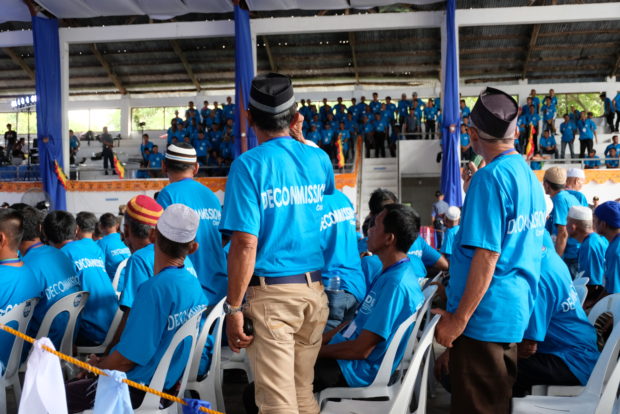
FILE PHOTO shows MILF fighters and their weapons that were deactivated during the second phase of the decommissioning, which was launched in September last year. BONG S. SARMIENTO
SULTAN KUDARAT, MAGUINDANAO –– For more than 24 hours the previous week, Roel Aliasgal, 50, sailed from the island-province of Sulu, along with at least 100 other fighters of the Moro Islamic Liberation Front (MILF) to arrive at the provincial capitol for a simple ceremony here.
He was the 12,000th MILF fighter deactivated under the second phase of the decommissioning process that began in August 2019.
Like the other former combatants, he received P100,000 on March 11 at the provincial capitol during the ceremony, signaling the conclusion of the second phase of the decommissioning process.
Born a Tausug and raised in Sulu, Aliasgal was among those who formally gave up the decades-old armed struggle the MILF waged against the government that claimed the lives of some 120,000 people, including civilians.
The turnover was the second part of the ceremonial decommissioning (also called its first phase) started during the term of former President Aquino following the signing of the Comprehensive Agreement on the Bangsamoro (CAB), the final peace pact between the government and the MILF in 2014.
For phase two, 30 percent of MILF combatants and their weapons have been decommissioned under the terms of the Annex of Normalization of the CAB.
Aliasgal said he wanted to start a “small business” using the amount turned over to him as financial aid from the government.
The government along with the MILF aimed to sustain peace in the former conflict areas by uplifting the lives of former rebels.
“We will invest. I told my comrades, whatever we receive in this decommissioning, we will use it as an instrument towards our long-awaited peace. We all believe that peace comes from within us,” he said.
In a statement, the foreign-led Independent Decommissioning Body (IDB), which oversees the decommissioning process, commended the government and the MILF for adhering to the terms of their peace accord.
“(The successful conclusion of the second phase is) another historic milestone by the parties to achieve a just and lasting peace in the Bangsamoro,” said the statement from the IDB chaired by Turkish Ambassador to the Philippines Fatih Ulusoy and composed of the governments of Turkey, Norway, Brunei, and representatives from the government and the MILF.
President Duterte witnessed the launching of the second phase of the decommissioning process in September last year also at the old provincial capitol here.
With the completion of the second phase, Aliasgal expressed hope he and his former comrades would tread peaceful and better lives.
“I hope that our lives and mindsets would be back to normal, that we wouldn’t go back to where we’ve been before,” he said, referring to the war that stunted the growth of the region known today as the Bangsamoro Autonomous Region in Muslim Mindanao (BARMM).
He vowed to encourage the youth to get an education to lead better lives and to contribute to the growth of the new Bangsamoro region.
BARMM replaced the Autonomous Region in Muslim Mindanao following the plebiscites last year that ratified the Bangsamoro Organic Law.
Under the second phase, at least 2,100 assorted weapons and more than 500 ammunition were also turned over by former MILF combatants to the IDB, according to the data from the Office of the Presidential Adviser on the Peace Process.
The third phase of the decommissioning process is slated to commence this year. Another 35 percent of the 40,000- strong MILF will be decommissioned during this phase, while the rest of the remaining armaments will be processed until 2022 for the expected signing of the exit agreement between the government and the MILF.
OPAPP said the government had earmarked P2.4 billion this year to implement the other aspects of normalization, which include education, health, technical and livelihood training, livelihood programs and assistance, agriculture support, social interventions, and camp transformation.
Mohagher Iqbal, MILF peace implementing panel chair, said the peace deal prescribed the graduated decommissioning of MILF combatants and weapons as key milestones of the peace process had been achieved.
“Our lives in the MILF … almost 50 years of armed struggle, so now we will be moving towards a normal life. We now have peace, justice, socioeconomic intervention from the government, from the international community. So In Shaa Allah, our lives will be better especially [the lives] of MILF combatants,” he said.
Presidential Peace Adviser Carlito Galvez, Jr. lauded the successful implementation of the second phase of the decommissioning process, noting that its effects “are now starting to be felt by the MILF members, their families, and communities.”
Galvez said the Bangsamoro peace process remained on track. President Duterte earlier issued a directive to implement all signed peace agreements with the various Moro fronts.
“With the successful second phase of decommissioning of MILF combatants and their weapons, we are looking forward to starting the third phase within the year. The government and MILF leadership are optimistic that we can surmount the challenges we face along the way and that by 2022, we can already sign the exit agreement,” Galvez said.
https://newsinfo.inquirer.net/1248102/12000-milf-fighters-deactivated

No comments:
Post a Comment
Note: Only a member of this blog may post a comment.